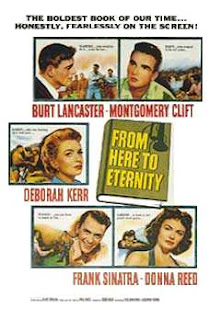From Here to Eternity
 After the silliness of back-to-back Best Picture awards going to An American in Paris and The Greatest Show on Earth, Oscar remembered he's mostly awed by serious drama, and the 1953 award went to From Here to Eternity, directed by Fred Zinneman and adapted from the sprawling novel by James Jones.
After the silliness of back-to-back Best Picture awards going to An American in Paris and The Greatest Show on Earth, Oscar remembered he's mostly awed by serious drama, and the 1953 award went to From Here to Eternity, directed by Fred Zinneman and adapted from the sprawling novel by James Jones.The story of servicemen stationed in Hawaii just before the attack on Pearl Harbor, it's noteworthy today for its scene featuring Burt Lancaster and Deborah Kerr smooching while surrounded by crashing waves, but this film is much more than that. It's an honest, albeit sanitized, look at the life of career soldiers, and the often cruel mini-societies that exist within a company. It also has a very frank, albeit sanitized, view of the women who love them.
Jones' novel was pretty hot stuff for its time, and the script, a great one by Daniel Taradash, walks a tightrope in the days when the Production Code still existed. Adultery, promiscuity and prostitution are all there, but never spoken aloud and put in the kindest terms possible. Donna Reed, for example, plays what would today be called a prostitute, but in this film she's referred to as a "hostess" in a private club.
The story centers around two G.I.s--Lancaster as the no-nonsense top sergeant who runs the company efficiently while his captain spends most of the time cheating on his wife, and Montgomery Clift as a new transfer. Clift has two talents--bugling and boxing, but he has quit the latter due to blinding someone in the ring. The captain wants him to join his boxing team, but he refuses, and earns the enmity of the other boxers, all of them non-coms, who make his life a living hell. Lancaster, meanwhile, romances Kerr, the neglected wife of the captain, who is known around camp as what could be called "loose." Lancaster is warned about her by another soldier, played by TV's Superman, George Reeve.
But they fall in love anyway, and Clift falls for Reed. Clift's good friend is Frank Sinatra, who livens things up with his gregarious Italian charm. His only problem is picking a fight with Ernest Borgnine, the menacing sergeant of the guard at the stockade. A lot of this reads like soap opera, and some of it is pretty sudsy, but mostly it's sharp, well-written and acted drama.
Anyone with a basic knowledge of American history knows what's coming, and in one scene Lancaster stands next to a calendar clearly marked "December 6." Sure enough, the Japs arrive right on time the next morning, and with the use of new footage as well as stock, the attack on Pearl Harbor is the climax of the picture. Even as primitive as the effects were in those days, or how obvious the stock footage, it's still miles better than Michael Bay's interpretations of those events.
Sinatra won the Oscar for Best Supporting Actor, and Reed won the female equivalent. This was the role that infamously became fictionalized in The Godfather as the one that Sinatra got through Mafia ties. All involved denied that, but it is true that he begged for the part (it may have been his wife, Ava Gardner, who called in favors to get it for him). His career was in the Dumpster at that time, and he took a rock-bottom fee to play the part. It all paid off for him quite handsomely, though, as the film was a smash hit and he was back as one of the biggest stars in the world.


Comments
Post a Comment